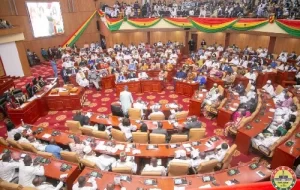Development Economist Dr. Frank Bannor, Head of Research at the Danquah Institute (DI), has warned against minimizing or disregarding the impact of global economic forces when discussing Ghana’s current economic situation.
He stressed that ignoring the influence of exogenous factors—external forces like COVID-19 and the Russian-Ukrainian war, which impacted international trade policies, global market shifts, and geopolitical dynamics—is not only deceptive but, in his words, “political propaganda” in an
Dr. Bannor emphasized the interconnectedness of the world economy, pointing out that problems that cut across national boundaries are having an increasing impact on economies around the world. He asserts that since these outside factors have a substantial impact on everything from inflation rates to currency stability, they must be taken into consideration in any thorough economic analysis.
“In a globalised world, local economies do not operate in isolation. When we say that exogenous factors did not affect the global economy, then we are doing political propaganda. Economic policies cannot be effectively crafted or understood without acknowledging the broader global economic dynamics,” he stressed.
He cited a Reuters article titled “Volkswagen Weighs Wage Cuts, Bonus Reductions” to show how even corporate behemoths like Volkswagen are being impacted by the state of the world economy.
In order to save an estimated 4 billion euros, Volkswagen is looking into a number of cost-cutting measures for its core brand, according to Handelsblatt. These include a proposed 10% wage reduction and a two-year wage freeze.
According to reports, Volkswagen’s top management has also thought about limiting bonuses for top-level staff, cutting back on anniversaries-related extra payments, and possibly closing some German manufacturing facilities.
He reiterated that any suggestion that exogenous factors do not affect economies globally would be “political propaganda,” explaining that the reasoning cited in these reports points to the severe economic challenges and global market dynamics.
He also made a comparison to recent events in China, where the central bank has responded to the ongoing changes in the global economy by introducing loans at a low interest rate of 2.27% to encourage local business investments. He pointed out that as an economist,
“This could be seen as essentially free money to stimulate growth amid turbulent global dynamics.” Such moves, he argued, reinforce that Ghana’s economic challenges cannot be viewed in isolation but are tied to wider global economic patterns.”
Dr. Bannor emphasized how the National Democratic Congress (NDC) left the New Patriotic Party (NPP) government with an economy that expanded by 3.4% in 2016. By the end of 2017, growth had accelerated to 8.3%, he said.
As a point of comparison, he emphasized the marginal rate of change under prior administrations. For example, the economy expanded by just over 6% in 2006 under President Kufuor. This trend persisted until the administration of President Mills, when growth remained relatively constant.
He said Ghana’s growth rate peaked at 14% in 2011, the year oil production started, and then fell to 8.4% in 2012. Under President Mahama, however, growth had slowed to about 7.2% by 2013, 2.8% in 2014, and 2.12% in 2015.
He emphasized that the economy was compelled to enter an IMF program by 2015, partly as a result of falling commodity prices and poor economic management, even in the absence of worldwide crises like COVID-19 or the conflict between Russia and Ukraine.
According to him, Ghana’s GDP growth rate briefly increased to an impressive 14% after oil production began in 2011, but by 2012, it had fallen to about 8.3%. “The economic difficulties worsened under Mahama’s rule, and in 2014, GDP growth dropped to as low as 2.8%.
He emphasized that prior to COVID-19, Ghana’s economy grew at an average rate of 6% between 2017 and 2019 under President Akufo-Addo. According to IMF data, Ghana’s economy is expected to grow by 7.2% in 2020, he said, demonstrating the importance of sound fiscal policies. He did point out, though, that the pandemic had a significant negative impact, reducing growth to 0.5%.
According to IMF data, the economy recovered to 5.1% by 2021, making it one of the fastest recoveries in the Global South. Ghana has maintained a comparatively strong economic performance since 2023, despite additional external shocks brought about by the Russia-Ukraine war in 2022.
He said that the second-quarter growth rate of 6.9%, which is among the highest in Africa and surpasses that of larger economies like Nigeria, Kenya, Egypt, and South Africa, demonstrates the Ghanaian economy’s resilience in the face of global unrest. He noted that in 2019, inflation






